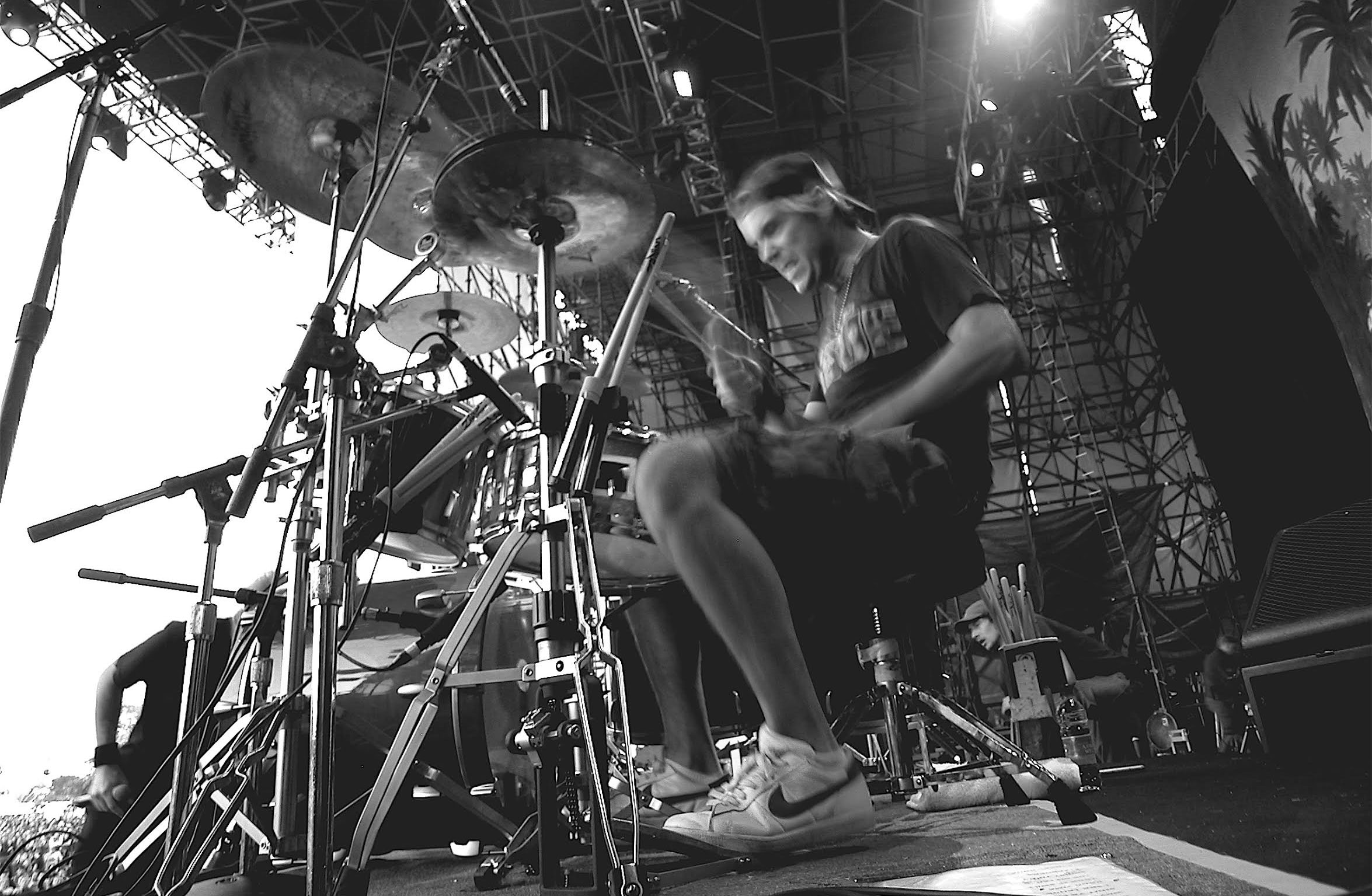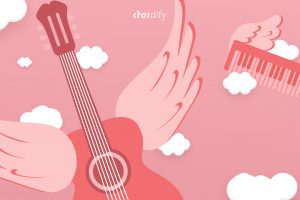The Pains of Being Pure at Heart are an American indie band from New York City. Their name comes from an unpublished children’s story of the same title and the band has released four albums in total. Their latest album, The Echo of Pleasure was released this month.
Founding member and principal songwriter Kip Berman sat down with Chordify to talk about his musical career, learning to play an instrument and the fact that many young people waste a lot of time in songwriting trying to prove to people they are smart.

Which song or artist inspired you to pick up an instrument?
Which song or artist inspired you to pick up an instrument?
I was fooling around on guitar when I was about 12 or 13 to Tom Petty songs – that was my step dad’s favorite band. He and my mom were both really into classic rock, and I also liked that kind of music – I still do. But so much of it was very technical, and I just wanted to play songs I could actually play. So when Nirvana was happening that felt so cool, because their songs were not so hard – you just needed to know 3 or 4 chords, and it would more or less sound like Nirvana. Even Smashing Pumpkins songs were usually too hard for a beginner, as Billy Corgan is a classic rock/metal guitar god who happened to be labeled “alternative” in the 90s.
What was the first song that made your fingers bleed?
I don’t know if there was any actual blood, but my friends and I would play the Nirvana album “Incesticide” over and over and over again in my friend’s basement. Also, we’d play the Vaselines songs that Nirvana covered, not being too aware that they were covers. When we were a bit older in high school, we covered songs by Weston (“Feeling Stupid Feelings”) and Propagandhi “Showdown” as well as a bunch of Plow United songs, ‘cause they were a local punk band we all loved.
What was your biggest fail?
I don’t think I ever thought to give up, it always felt compulsive and a necessary part of my life. I was talking to my grandparents recently and they were reminding me that when I’d go visit them when I was a teenager, I’d spend most of the visit just upstairs playing guitar – not in a rude way, but that was my favorite thing to be doing. Even in the middle of summer when there were so many other things going on around, I would just play guitar and write (probably very bad) songs.
What’s your favorite chord?
I like holding down a “D” and the high “G” on the b and high e string when I play an otherwise normal G, C, or Emin chord. In general when I change chords I try to move my fingers as little as possible so that it creates droning sounds that ring constantly throughout. I don’t know what these chords are called, so It’s hard to explain – but it’s a way that seems to create this “heavenly” sound on the guitar, while the bass guitar may change below it.
When did you start to write your own songs?
I think I wrote my own songs from the very beginning of learning to play, because my own songs were easier than, you know, Led Zeppelin and things like that.
I think most of the songs I write are along more or less of a similar trajectory- they have an intro, a verse, chorus, verse, chorus, bridge, double chorus. There are some that are different, like “Higher Than the Stars” or “Art Smock.” I think what makes me proud of a song – if I’m allowed to be proud of a song I write – is a connection between the music and the lyrics.
It’s not perfectly recorded, but I think “Higher Than the Stars” is one of the best songs I’ve ever written. As for our new album, I think “When I Dance With You” surprised me, because it is constructed around everything other than what my guitar is playing. It’s a repetitive percussive synth pattern and a melodic bass line – and the lyrics are dead simple, but feel precise and to the point.
I think many young people waste a lot of time in songwriting trying to prove to people they are smart, when the thing that resonates in music isn’t that – it’s about a direct emotional connection. I used to ridicule “simplistic” lyrics, but now I realize that saying something that is complex simply is the sign of real talent. I think a band like The Cure get misunderstood and under-appreciated because of this this. Our best songs have the least amount of words.
What was your first time playing with others like?
I mean, when you’re a kid and playing Nirvana covers in the basement all afternoon, it’s really exciting. You can’t hear or understand how bad you actually are – thank god.
What did you take away from playing other people’s songs?
We don’t do a lot of covers. But I think covering the James song “Laid” a couple years ago inadvertently helped simplify some of the writing on our new record. A song like “Anymore” is literally just like a huge riff over three chords (or at least the best part of that song is that). I realized what a powerful song “Laid” was, and really it didn’t do anything different, throughout. It’s not like a direct inspiration/ripoff kind of thing, but sort of one of those things when you take it apart and realize the reason it works so well is that it doesn’t have a lot of parts that can break.
Do you still play songs written by other artists?
I covered Lorde’s “Liability” in concert a few times this year. The lyrics of the song really spoke to me. I hate that vampire thing where old indie artists play contemporary pop songs to try to get attention – because that’s not what this was. It was the rare song that i’ve come across in recent years that was deeply moving to me. It’s exquisite, heartfelt – and when I play it I realize how weak my songs are in comparison, or at least – how I’m rarely so open, so direct and powerful as that song. It’s incredible a teenager can write something so good – and I often feel so down thinking about how I will never write anything half as beautiful.
Have you ever tried to tackle a song and failed miserably?
I covered Tori Amos’s “China” – and that was, at best, “ok.” I originally tried “Silent All These Years,” and it was far beyond what I was capable of at the time. The range she has (not just notes, but the emotional range she conveys) as a singer is so incredible, but it’s also so hard to sing a song that another person has performed with such an inimitable delivery. You have to do it very differently, or else it just reminds people how good the original is in comparison. It’s like asymmetrical warfare, you have to meet the song on your own terms – because something by Tori Amos is so of Tori, that it needs to be almost unrecognizable to be something other than embarrassing.
Any advice for aspiring rock stars?
“Persevere” is a given. But if you need external inspiration to keep on playing, you may as well quit now. The drive to do this must come from within – and be inspired by the music you love. There is nothing more continually defeating as writing songs and putting them out in the world. I am very thin skinned. So I just don’t read reviews and remind myself that every artist I admire made real music – and any time I think i’ve done something well, to listen to Leonard Cohen or Tori Amos and be reminded that what I am is pretty mediocre in comparison to that.
Team lead Premium by day, poet by night. On weekends, Jorine likes to explore the outer corners of her spectrum of interests, be it at a punk concert, a techno club or a pop festival.


